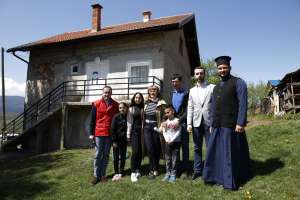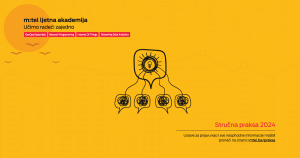THE HAGUE/SARAJEVO, April 23 (FENA) - Former Bosnian Serb political leader Radovan Karadžić is starting his appeal against his conviction for genocide and other wartime crimes at the UN court in The Hague, claiming his trial was flawed.
Appeals in Radovan Karadžić’s case are being heard by the UN’s Mechanism for International Criminal Tribunals on Monday and Tuesday, with the former Bosnian Serb leader claiming his trial was a “flawed process” that “led to an unjust result”.
In his 238-page appeal brief, Karadžić details what he claims are “48 substantive and procedural errors” that allegedly led to his wrongful conviction for genocide and war crimes against non-Serbs in Bosnia and Herzegovina in March 2016. He was sentenced to 40 years in prison, BIRN reports.
The judgment should be reversed but if the appeals chamber upholds any part of the conviction, it should impose a lower sentence, Karadžić argues.
The prosecution is also appealing, asking the judges to increase Karadžić’s sentence to life imprisonment.
In March 2016, the three-judge panel at the International Criminal Tribunal for the Former Yugoslavia unanimously determined Karadžić was the mastermind behind four joint criminal enterprises designed to permanently and forcibly remove non-Serbs from large parts of Bosnia and Herzegovina in order to establish Serb dominance.
The former president of Republika Srpska was found guilty of genocide in Srebrenica in 1995, the persecution of Croat and Bosniak civilians throughout Bosnia and Herzegovina, a campaign of shelling and sniper attacks campaign against the population of Sarajevo intended to spread terror, and of taking UN peacekeepers hostage.
Karadžić was acquitted of a second charge of genocide against Bosniaks and Croats in seven other Bosnian municipalities in 1992 - Bratunac, Foča, Ključ, Prijedor, Sanski Most, Vlasenica and Zvornik.
The judges’ conclusion that Karadžić did not possess the “genocidal intent” to destroy non-Serbs in these seven municipalities is the focus of the prosecution’s appeal against the first-instance judgment.
Most of Karadžić’s 50 grounds for appeal are procedural. He claims he “did not receive a fair trial” as a result of “the Trial Chamber’s failure to limit the scope of the amorphous indictment and to ensure that the prosecution complied with its disclosure obligations".
The defense also alleged the court had “double standards” and favored the prosecution.
While not directly challenging the judgment’s main factual findings about the crimes, the defense says that “the Trial Chamber’s reliance on debatable inferences, instead of solid evidence, to conclude that President Karadžić shared the common purpose of four separate JCEs [joint criminal enterprises], was an error that resulted in a miscarriage of justice”.
“Nowhere was this miscarriage of justice more apparent than when the Trial Chamber found him guilty of genocide by inferring that he shared the intent to kill the prisoners from Srebrenica based upon its own interpretation of a cryptic intercepted conversation. This inference is unsound and untrue and the verdict is unjust,” the defense says in its appeal.
The “cryptic intercepted conversation” referred to by the defense took place on July 13, 1995, when Karadžić was told by his envoy in Srebrenica, Miroslav Deronjić, that 2,000 prisoners from Srebrenica had arrived in nearby Bratunac and that more were expected.
According to Deronjić’s notes, Karadžić told him that “all the goods must be placed inside warehouses before 12 tomorrow... not in the warehouses over there, but elsewhere”.
In its judgment, the Trial Chamber inferred that the “goods” were actually Bosniak prisoners who the Bosnian Serb Army, under Karadžić’s supreme command, transported to Zvornik the next day and subsequently executed “at least 5,115” of them.
The defense appeal claims there is an alternative interpretation of this conversation that Karadžić intended not to execute Bosniak men, but to send them to a military prison in Batkoić.
Karadžić “had no involvement in the execution of the men from Srebrenica”, so the trial chamber was wrong when it found that he “shared the common purpose of eliminating the Bosnian Muslims in Srebrenica”, the appeal says.
According to the defense, this means that Karadžić did not possess genocidal intent in Srebrenica.
Addressing his conviction for persecution and other crimes in 20 municipalities in Bosnia and Herzegovina, Karadžić alleges that the court “took his statements favoring political autonomy for Serbs out of context to erroneously conclude that he favored a homogenous State from which Muslims and Croats should be expelled”.
In the appeal against his conviction for terrorizing Sarajevo, Karadžić contends that judges “disregarded his many orders aimed at preventing fire against civilians, misapplied principles of ‘distinction’ and ‘proportionality’ by failing to assess the shelling from the perspective of a military commander, and ignored the United Nations’ own expert report on the Markale market shelling”.
Karadžić argues that the trial chamber wrongly concluded that a shell that hit Sarajevo’s Markale market on February 5, 1994, killing 66 civilians, was fired by the Bosnian Serb Army.
In response to Karadžić’s conviction of hostage taking, the defense argues that members of the UN protection force UNPROFOR were “lawfully detained” as they took part in combat-related activities against the Bosnian Serb Army.
The prosecution’s appeal meanwhile contends that the first-instance ruling wrongly failed to find that Karadžić and other members of the joint criminal enterprise possessed genocidal intent against Bosniaks and Croats in the seven other Bosnian municipalities in 1992.
Prosecutors argue that the judges applied “an overly narrow definition of genocidal intent” and made an error in concluding that "the objective of permanent removal [of non-Serbs]… precluded a finding of genocidal intent” to destroy Bosniaks and Croats as ethnic groups in the seven municipalities.
The final judgment in the Karadžić case is expected by December.
(FENA) S. R.









